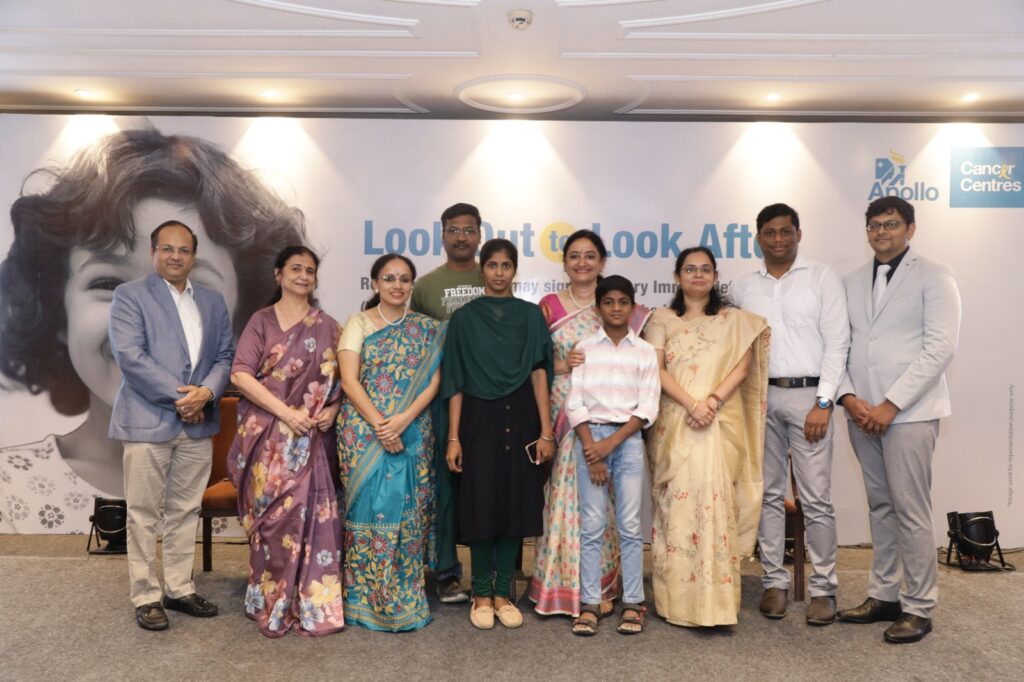Chennai, 2024 – Apollo Cancer Centres (ACC)advocates raising awareness and addresses the challenges posed by the often-overlooked Primary Immunodeficiency Disorders (PIDs). In commemoration of the World Primary Immunodeficiency Week, observed from April 22nd to 29th, ACC spearheads discussions around this crucial health issue, shedding light on its prevalence and impact.
Warning Signs
• Frequent Infections such as ear infections, sinusitis, bronchitis, or pneumonia, which may occur more often than usual or are challenging to treat with standard medications.
• Delayed Growth or Development such as slow weight gain or height growth, as well as delays in milestones like walking or talking, which could indicate an underlying immune system problem.
• Persistent Thrush or Skin Infections such as abscesses or boils, which may indicate a weakened immune system unable to fight off common pathogens.
• Family History of PID or Consanguinity
When to see a doctor:
• If you or your child experience any of these warning signs frequently or persistently.
• If infections seem more severe or challenging to treat than usual.
• If there’s a family history of PID or if you suspect an immune system problem.
• If you have concerns about your or your child’s growth or development.
Primary Immunodeficiency Disorders represent a group of inherited conditions that compromise the body’s immune system, leaving individuals susceptible to infections. Shockingly, a significant portion of individuals with PIDs remain undiagnosed, leading to untreated complications and heightened risks. Despite the widespread impact of PIDs, there is alarmingly high mortality rates among affected infants, particularly those below one-year-old. Undiagnosed cases significantly contribute to this concerning statistic. While PIDs tends to be more severe in children, it can also affect adults, albeit with differing diagnostic challenges. In adults, the road to diagnosis may be prolonged, sometimes spanning up to 25 years from the onset of initial symptoms to an accurate PID diagnosis. This delay underscores the importance of heightened awareness and proactive screening initiatives to ensure timely medical intervention and improved outcomes for individuals affected by PID.
Over 6 million people globally suffer from PIDs, with an alarming 70-90% of cases remaining undiagnosed. In India, where consanguineous marriages are prevalent, the incidence of PIDs is notably high, exacerbating the challenge. It is estimated that there could be more than one million patients with PID in India. Since PID is a genetic condition, there is a chance of every pregnancy being affected. Prenatal diagnosis or testing the foetus at 10 to 11 weeks for pregnancy can help detect whether the foetus is affected or not and families need to be counselled accordingly.
According to WHO (World Health Organization and IUIS (International Immunological Societies), over 120 Primary Immunodeficiency Disorders (PIDs) exist, with antibody deficiencies like CVID (Common Variable Immunodeficiency), and XLA (X-linked Agammaglobulinemia), topping the list.
Dr. Revathi Raj, Senior Consultant in Paediatric Haematology Oncology at Apollo Cancer Centre, Chennai, “PIDs, though often unnoticed, can significantly impact a child’s health. Early diagnosis and timely treatment of primary immune deficiencies can help these children to lead a good quality life. Awareness is not only important for treatment but also for prevention. We envision a future where every child with PID can lead a healthy and fulfilling life.”
Dr. Ramya Uppuluri, Consultant – Paediatric Haematology Oncology, emphasizes, “From cutting-edge diagnostics, including genetic testing and immunological assays, which play a pivotal role in accurately diagnosing PID, to advanced therapies like bone marrow transplantation, our comprehensive center for PIDs is equipped with the expertise and resources to make a meaningful difference in the lives of those affected by PID”.
Dr. Preetha Reddy, Executive Vice Chairperson, Apollo Hospitals Enterprise Ltd, said, “As we face the critical challenge of Primary Immune Disorders affecting millions, often in silence, Apollo Cancer Centres is committed to lighting the path forward. Awareness of these conditions is crucial, not only for effective treatment but also for prevention. By educating families and healthcare professionals, we aim to ensure early diagnosis and timely intervention, thus transforming the lives of countless children. Together, we are dedicated to a future where every child with PID can enjoy a healthy and fulfilling life.
Thirteen-year-old Kavin, the PID warrior, said, “Battling constant infections was terrifying. Each cough and fever felt life-threatening. It wasn’t until Apollo Cancer Centre diagnosed and treated me for PIDs. Despite the fear, the medical team’s counselling provided immense comfort and I hope for a healthier future.”
Comprehensive Centre for PIDs at ACC is equipped with cutting-edge facilities, including a state-of-the-art Pediatric Intensive Care Unit (PICU), access to internationally acclaimed specialists in Pediatric Infectious Diseases and proficiency in PID diagnosis. ACC’s efforts extend beyond treatment to proactive measures such as genetic counselling for families with a history of PIDs, aimed at prevention at large. By nurturing awareness and facilitating early medical intervention, ACC strives to reshape the narrative surrounding Primary Immunodeficiency Disorders, ensuring a brighter future for affected children.







More Stories
SIMS Hospital Performs India’s First Combined Open-Heart Valve Replacement and TAVR Valve-Specialised Aortic Graft Surgery
Kauvery Hospital’s 24×7 Diabetes Helpline Crosses 1500 Days of Lifesaving Support Across Tamil Nadu
Apollo Cancer Centres Launches Dedicated Robotic Pancreatic Surgery Program